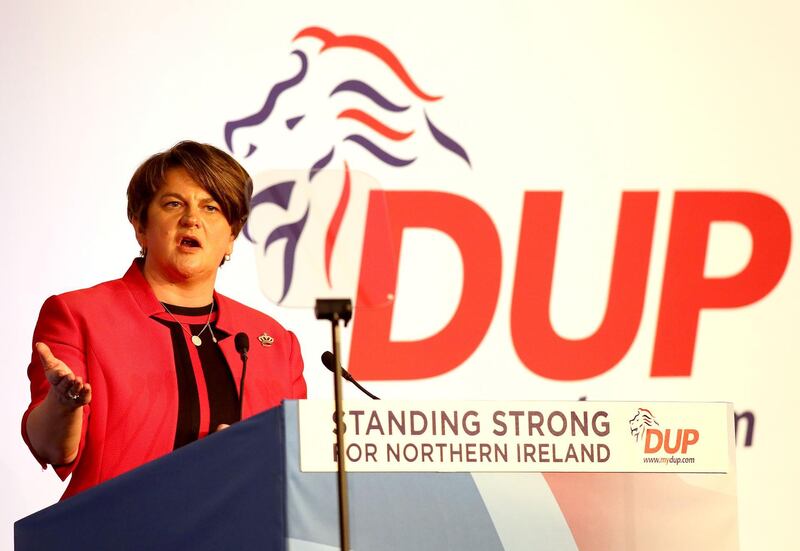After two years of protracted grappling with the most ardent of Europhiles, it is in the conference room of a plush hotel in South Belfast that Theresa May might find the biggest hurdle to an amicable Brexit agreement.
On the eve of the British Prime Minister's trip to Brussels to draw up the final withdrawal agreement with the European Union’s remaining 27 member states, the threat comes from one-time allies.
Two years ago, the Democratic Unionist Party's 10 Westminster MPs were Mrs May’s only means of clinging to power after a disastrous decision to call an early election. Now the DUP, unhappy with the proposed Brexit deal, are rallying against her government and the 585-page agreement.
They portray the deal as an existential threat to Northern Ireland. “We will not accept any Brexit deal that divides Northern Ireland and Great Britain economically, or constitutionally,” said the party’s only member of the European parliament, Diane Dodds.
Without the DUP’s votes, and plagued by Brexiteer rebels in her Conservative party, the arithmetic appears difficult for Mrs May to get any Brexit agreement passed in parliament.
It is not the first time Northern Ireland has rallied against London. Almost exactly 100 years ago Edward Carson rallied against Westminster rule over the province of Ulster, as it was known them. Now a statue of him, his right hand aloft, stands in front of Stormont, the home of Northern Ireland’s devolved assembly. The assembly has not sat in two years as a result of a political deadlock.
“The reality is that if we are to secure a better outcome than is currently on offer then the only option is to look beyond this current draft withdrawal agreement and work in the time ahead for an improved outcome,” warned DUP leader Arlene Foster in her speech to the conference, leaving no doubt as to her party’s opposition to Brexit in its current form.
Northern Ireland’s place in the United Kingdom is far more important than its relationship with the European Union, she said.
______________
Read more:
[ The moment of reckoning is upon Theresa May as she seeks EU backing for her Brexit deal ]
[ This lady should be for turning: stubbornness could be Theresa May's ultimate downfall ]
[ Draghi to be grilled this week as ECB mulls future of €2.6tn stimulus ]
______________
For the DUP, the Brexit deal’s so-called backstop arrangement puts its support for Mrs May in question — even with professed republican Jeremy Corbyn waiting in the wings to form a government in the event Mrs May’s government should fall.
Mrs Foster’s deputy, MP Nigel Dodds, described the agreement as a “two-way street”. He said it might have to be rethought if Mrs May’s Conservatives do not play their part.
Yet the DUP are not entirely isolated; they have found support in the Eurosceptic wings of Westminster, notably Boris Johnson. One of Mrs May’s staunchest critics when it comes to Brexit, Mr Johnson was invited to address the DUP conference, prompting on observer to tweet: “The ego has landed."
The former foreign secretary took the opportunity to warn of Northern Ireland becoming “an economic semi-colony of the EU”.
Stoking the flames of a unionist wild fire, Mr Johnson continued: “We would be damaging the fabric of the union with regulatory checks and even customs controls between GB and NI on top of those extra regulatory checks down the Irish Sea that are already envisaged in the withdrawal agreement.”
Indeed, on Tuesday, the unionist hardliners fired several warning shots, abstaining on a several votes on a finance bill in parliament they would have been expected to support.
But other events suggest the Mrs May's government is not as hamstrung by the DUP as some might think.
Recent days have seen the prime minister attempting to exploit a recently emerged split between businesses in Northern Ireland and her "supply and confidence" partners, as the DUP's support arrangement with government is called.
On Thursday, a delegation of Northern Ireland business leaders publicly backed the withdrawal agreement, while Mrs May has dispatched both Chancellor Philip Hammond and the secretary for international trade, Liam Fox, to the region to win them over. Some in Downing Street believe that with Northern Irish business on side, she can soldier on irrespective of the DUP.
Ms Foster insisted that the supply and confidence arrangement was still alive. If that is the case, then it is barely so, and it is surely now on life support.
Mrs May goes to Brussels on Sunday to agree on a final version of the withdrawal agreement with the EU. She takes with her a seeming inability to satisfy the DUP's demands; and some fear it is just a matter of time before the power goes out.







